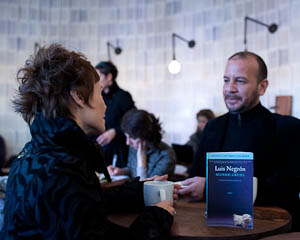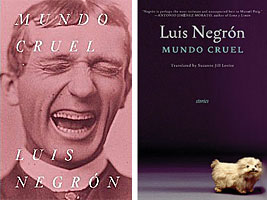article by Keith Widyolar
Luis Negrón read from his hit book “Mundo Cruel” tonight at the King Juan Carlos Center at New York University. The book is a collection of short stories written in the spoken language of small town Puerto Rico where Luis is from. Somehow Luis Negrón’s words have eyes. The stories are universal tales of loneliness and the crazy things we do because of it. Things happen in life that make you want to laugh and make you want to cry at the same time. That is what this book is about.
Luis has a real gift for rendering the spoken word in print and “Mundo Cruel” is one of those books that you can’t put down once you start reading. Though set in Puerto Rico, everybody relates with the stories because loneliness is something we all suffer from. The book is especially relevant for New Yorkers because New York, even with 25 million people, can be such a lonely city.

Luis Negrón at McNally Jackson Books. Photo Keith Widyolar
In 2010 Luis self-published “Mundo Cruel” with a run of one hundred copies. He hoped to sell fifty or so and planned to give the rest to friends and family. Through simple word-of-mouth people kept buying copies until he sold out.
Luis kept printing small runs of more copies, but didn’t have any money to invest in it. When he got a large order from Borders Books, he didn’t have the money to print it. “Do you know what misery is?,”Luis asked us. “It’s when something good happens to you, but you can’t be happy about it.”
The book’s fame grew and Luis finally got a publisher. “Mundo Cruel” is now on its 5th edition in Puerto Rico, its 2nd edition in Central America and will appear in an English translation this February from Seven Stories Books. Luis continued explaining how it all happened.
La Feria del Libro
Luis sells books on a street of booksellers in his town. One day, one of the other booksellers gave him a present. It was a $1,200 plane ticket to Guadalajara, Mexico for the Guadalajara International Book Fair, the most important literary event in the Spanish-speaking world. The man said, you must go and show them your book.When the day came to leave, Luis walked up to the ticket counter at the airport and reached in his pocket for his new passport, but it wasn’t there. They wouldn’t let him on the plane and they wouldn’t let him change the ticket. If he couldn’t produce his passport everything was lost. The plane left. Luis explained his situation, asking for help, “Please understand that I cannot possibly go back to my friend who sacrificed to make such a gift and tell him that I lost this chance,” and then someone called. A janitor found the passport and Luis had been told to write his telephone number inside it.
Even though it wasn’t allowed, they put him on the next plane. At the fair, Luis got a publisher in Central America and is now on its 2nd edition there. The book is quite popular in Guatemala and Costa Rica. It’s written in street Puerto Rican, but the Central Americans like it. They say the language is kind of funny and you use old words so we like it. Luis explained that, “Spanish-language writers in the Americas are pressured to write in the the Univision accent. Though the stories are entirely fictional, they are told in the first person, so I had to write in the people’s voice.”
Seven Stories

Luis Negrón
The publisher was interested now, but they needed to find a translator. People compare Luis with Manuel Puig, the Argentine author of “Kiss of the Spider Woman,” who was one of the central figures of the Latin American Boom in literature of the 1960s and 1970s along with Julio Cortázar of Argentina, Carlos Fuentes of Mexico, Mario Vargas Llosa of Peru, and Gabriel García Márquez of Colombia.
So Gabriel searched the web for someone who had translated Puig. He found the name of Suzanne Jill Levine and got in touch with her. Gabriel was able to schedule a meeting. Just before leaving for the meeting, Gabriel looked her up again and realized that Suzanne was a winner of the PEN American Translation Award and had translated the entire works of Borges. Dios mio. Now he was nervous.
At the meeting Suzanne courteously explained that she was not translating any new writers, but the title made her curious. Gabriel left her a copy. Suzanne called him back saying that she couldn’t stop reading it. The work reminded her of Puig and she wanted to do the translation. The book will be released in English this coming February. When we met with Luis, he was making corrections to a galley proof.
The Pain of Reading
“Mundo Cruel” is available in Spanish at McNally Jackson Books in SoHo and online at Amazon. For the English translation, you’ll have to wait until February, but you can read an Opinion piece called “The Pain of Reading” that Luis wrote for the New York Times which was also translated by Suzanne Jill Levine. It’s the story of Luis’ humiliation on the day he told his father how much he loved the book “Little Women,” by Louisa May Alcott. On that day Luis cried, but we suspect that in the end he is having the last laugh.One day a friend excitedly called Luis to tell him that he’d been published in the New York Times. Luis bought a copy of the paper and looked and looked for the piece, but couldn’t find it. Of course, it was there. Luis told us that he realized in that moment that if you don’t believe in something, you will be unable to see it, even if its right there in front of you.
Mundo Cruel

Mundo Cruel Spanish & English Covers
It can be a cruel world, but it’s up to you whether you laugh or cry about it. Believe me and read this book. It will make you cry and it will make you laugh and maybe give you another way to see the world that is right there in front of you.
Fuente: http://newyorklatinculture.com/mundo-cruel/


No hay comentarios.:
Publicar un comentario